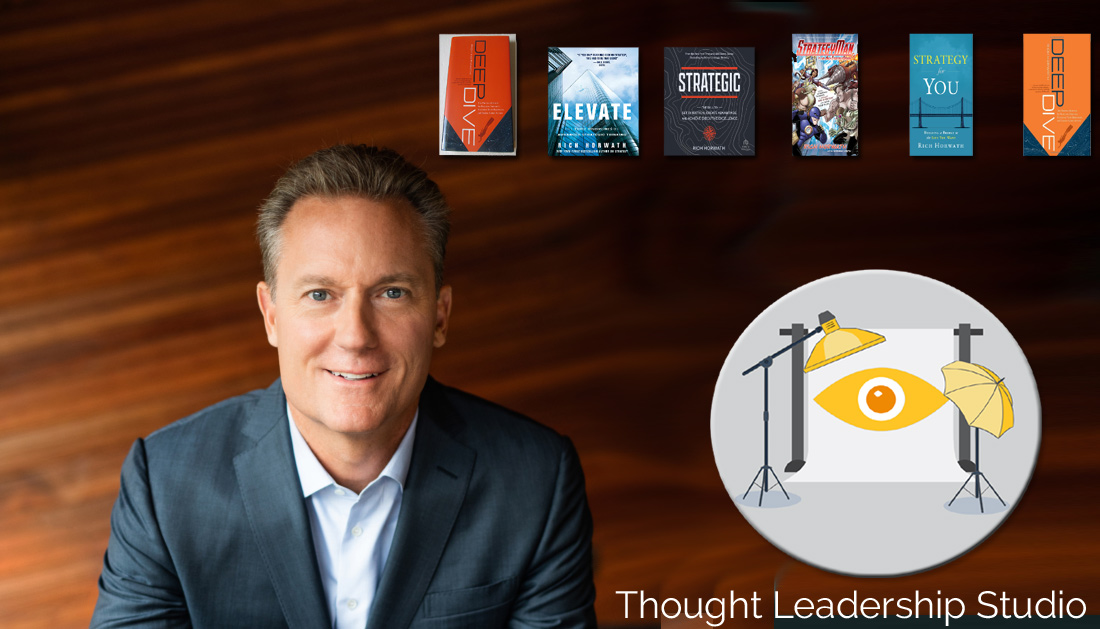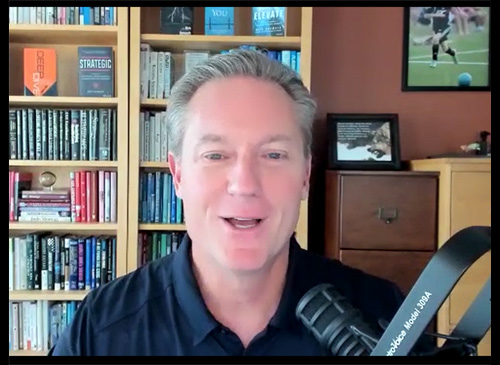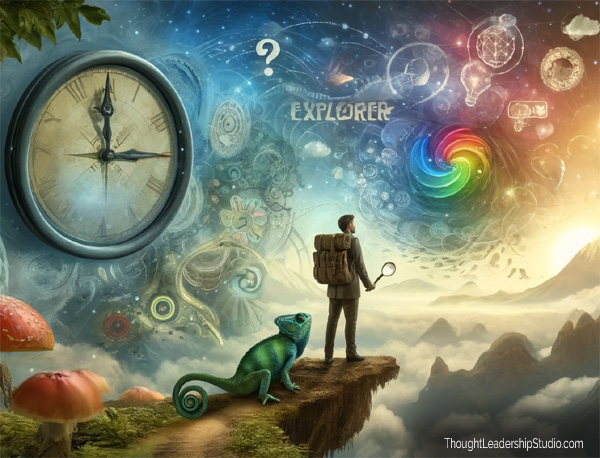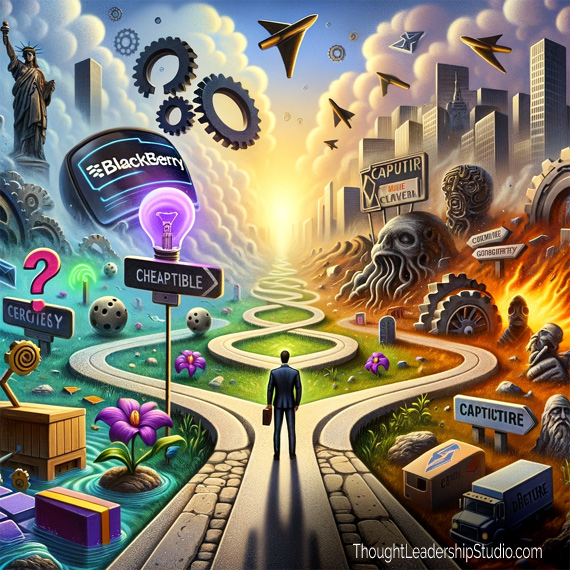Thought Leadership Studio Podcast Episodes:
Mastering Strategy with Rich Horwath
Episode 74 - Elevating Leadership: Harnessing Strategic Thinking and Planning for Executive Success with the Author of "Strategic"

#businessstrategy, #coaching, #consulting, #executivepresence, #insight, #interview, #interviews, #leadership, #management, #marketingstrategy, #motivation, #strategicthoughtleadership, #strategy, #thoughtleadership
Or Click here to listen or subscribe on appWhat this episode will do for you
:- Rich Horwath's Strategic Journey: Discover Rich’s path from marketing to becoming a leading expert in strategic thinking, including the pivotal moments that shaped his career.
- Key Elements of Strategic Thinking: Learn the fundamental components of strategic thinking and how to develop these critical skills for effective leadership.
- Proactive vs. Reactive Leadership: Understand the difference between proactive and reactive leadership, and why focusing on strategic planning over firefighting is crucial for long-term success.
- The GOST Framework for Planning: Gain insights into Rich’s Ghost framework (Goals, Objectives, Strategies, Tactics) for creating and implementing effective strategic plans.
- Curiosity in Leadership: Explore the importance of curiosity in leadership and how adopting an explorer’s mindset can drive innovation and continuous improvement.
- Avoiding the Status Quo Trap: Recognize common patterns that hinder strategic thinking, such as complacency and lack of detailed planning, and learn how to overcome them.
Rich Horwath.
In this episode, I'm thrilled to introduce Rich Horwath.
Rich is the founder and CEO of the Strategic Thinking Institute and a leading authority in strategic thinking. With experience as a chief strategy officer and a professor of strategy, he brings a blend of practical insight and academic rigor to his work with leadership teams.
Rich's journey into strategic leadership began when he realized the need for resources to help individual managers develop strategic thinking skills. This led him to create the Strategic Thinking Institute, where he enhances executive capabilities through workshops, coaching, and speaking engagements.
In our discussion, Rich emphasizes the importance of curiosity and an explorer's mindset in leadership. He shares insights on setting clear goals and creating detailed plans, using his GOST framework (Goals, Objectives, Strategies, Tactics). He also discusses time management, peak performance, and the connection between personal and corporate strategy.
Rich is a bestselling author of eight books, including "Strategic: The Skill to Set Direction, Create Advantage, and Achieve Executive Excellence." His work has been featured in major publications, and he offers free resources on his website, StrategySkills.com.
Join us as Rich Horwath shares his strategies for thought leadership, focusing on prioritization, differentiation, and having a clear destination. His expertise promises to provide actionable insights to elevate your strategic thinking and drive business success.
Some of Rich's coordinates:
Curated Transcript of Interview with Rich Horwath
The following partial transcript is lightly edited for clarity - the full interview is on audio. Click here to listen.
Chris McNeil: I'm Chris McNeil, with Thought Leadership Studio, and I'm sitting here across Zoom with Rich Horwath, who's the founder and CEO of the Strategic Thinking Institute, where he enhances leadership team strategic capabilities through workshops, executive coaching and keynote speaking. His mission is to help executives think, plan and act strategically to achieve their goals. He's a bestselling author of eight books featured in publications like Fast Company, Forbes and Harvard Business Review, and recognized by Chief Executive Magazine as the world's foremost expert on strategic thinking. That's incredibly impressive. Welcome, Rich.
 Rich Horwath: Chris. Great to be with you today. Thanks for having me.
Rich Horwath: Chris. Great to be with you today. Thanks for having me.
Chris McNeil: So maybe to help our listeners who may not already be familiar with you and your work have some context for where you're coming from... Was there a pivotal moment in your life, pivotal in that it led you on this path of teaching and leading in strategy?
From Tactical to Strategic: Rich Horwath's Light Bulb Moment
Rich Horwath: Yes, and I remember it vividly, even though I'm going to date myself.
It was a long time ago. It was about 25 years ago. I was working for a marketing firm and I was writing strategic plans for companies and we were doing the typical strategic planning offsite session where you get together for a couple of days offsite, you talk about the strategy, you try to come up with a plan, and I remember we had a break midway through the day and I was talking with one of the managers and he said, you know, Rich, I had my performance review and my boss said, I'm too tactical, I need to be more strategic. And he said, how do you do that, Rich? This was about 25 years ago.
 So most of the books on strategy at that time were really on corporate strategy books by Michael Porter, CK Prahalad really helping a corporation developed strategy, but at the time there wasn't really a roadmap for the individual manager or leader to go from tactical to strategic.
So most of the books on strategy at that time were really on corporate strategy books by Michael Porter, CK Prahalad really helping a corporation developed strategy, but at the time there wasn't really a roadmap for the individual manager or leader to go from tactical to strategic.
So that was really my light bulb moment to say, Hey, here's an opportunity to dig in, do some more research and try to put some things together, some practical ways for people to be strategic day in and day out. And so that really launched my company 22 years ago until today.
Chris McNeil: Wow. So you were in marketing then you saw the need for teaching, migrating from a technical to a strategic mindset.
Rich Horwath: Yeah, yeah, exactly. Chris, and as you know with your expertise in strategic thought leadership and marketing from a positioning standpoint, the thing that always fascinated me with marketing is you've got to be able to understand not only what are you good at and what are your capabilities and competencies, but you really need to understand the landscape that you're in.
So you need to understand the competition. What are they able to do? What are they good at? You need to understand customers, where is their value? Where is there not value for them? And then you need to put all those moving puzzle pieces together. And so that really fascinated me is how do we do that on a regular basis, and then how do we take that from a marketing standpoint, and then how do we align that with the strategies from our other teams, sales, finance, operations, it.
So that's why I started putting those dots together to say, Hey, if we can develop not only marketing strategy but strategy across the organization, that could even be a powerful way to get everyone aligned.
The Explorer's Mindset: Staying Curious in Strategy
Chris McNeil: That brings up a couple of potential threads that really interesting to me. One of them I'm getting, and correct me if I'm off, is curiosity.
Rich Horwath: Yes, yes. Great point there. I love the word curiosity you brought up because what I see sometimes is leaders who feel that they have to have control over everything, they have to have the control over the meeting. They're in the script that's being presented if they're presenting to other people or board of directors.
But then there's the few leaders that are comfortable and curious to your point, and are okay with going into situations saying, I'm going to have an explorer's mindset here. I'm going to really look to learn to come up with new ideas, new insights in this conversation, in this meeting, whatever it might be.
So I like that word curious you use because I do believe that the best leaders have that explorer's mindset where they're always looking to generate to create new insights, new learnings to help them bring more value to their team and to the people that they serve.
Chris McNeil: I love that explorers mindset term. To me, that speaks to and gives me an image of not getting caught in the expert trap, so to speak, because when you're the expert, then, "Hey, I know this. I don't need to continue to question my own beliefs or investigate the environment for changes".
But when you're the explorer, you might be an expert explorer, but that might be an expert at staying curious and new situations. So you take in new information.
 Rich Horwath: That's a great distinction too that you bring up. To your point, if we're just experts in our content, at some point the content is going to need to evolve. And the way that content evolves is it evolves through listening, questioning, being curious and understanding what's next.
Rich Horwath: That's a great distinction too that you bring up. To your point, if we're just experts in our content, at some point the content is going to need to evolve. And the way that content evolves is it evolves through listening, questioning, being curious and understanding what's next.
Too often I think, Chris, we as leaders, we're thinking about today and we're focused on our to-do list. And what I've found is that the best leaders are also dedicating time in their calendar to the future state of the business. So where do I want to be a year, three years from now in spending time today thinking about that and then positioning themselves to do that type of role.
Chris McNeil: That's another theme I caught initially that intrigued me, the perspective I would call it, of being able to zoom out and see both over a broader period of time. Maybe (a longer) time horizon is a characteristic of strategic thinkers and (also taking in more) space, taking more information from the environment and where you operate from your customer's thinking, your competitors' thinking, but to be able to take in that information.
And I think just we as humans, we have this tendency to get set in our beliefs and forget to question them, especially when things change. But leading change is a big part of strategy, isn't it?
Challenging the Status Quo: Creating, Delivering, and Capturing Value
Rich Horwath: Absolutely. Because when we set strategy, what we're really asking people to do is we're asking them to change the way that they behave, the way they position themselves. And so when we ask people to change, that becomes uncomfortable. And to your point, people like the status quo. We don't like to change. But again, if we look at companies in the past, like Blackberry, blockbuster video Circuit City, very, very good at what they did for many years, but then they got complacent. They gravitated to the status quo. They didn't push themselves out of their comfort zones, and they really stopped listening to and asking questions about what's the next piece of value that we can deliver to our customers?
And that's why they fell from the peak of their industry to the very bottom of the industry. So I think it's a great lesson for all of us leaders out there. We have to stay curious. We have to ask questions, and we have to build that listening mindset so that we're always recording what's happening. So we're almost taking a continual mental radar of our situation, what's happening in the market with our customers, the competition within our company.
And so we've got all of those things that we're trying to stay abreast of, but then take those insights and really channel them into how am I going to allocate my resources strategically so that I can bring greater value to the customers that we serve.
Chris McNeil: That makes perfect sense, especially in the context of what we talk about on this podcast: being strategic with your thought leadership, not just being seen as an expert, but having a positive impact on the thinking of an audience, which means curiosity is a big part of it.
 So is being able to be innovative and not just be a parrot of what you've discovered through your curiosity, but to have a vision for something new that doesn't exist already and bring that to life, which is getting out our comfort zones. And I'm sure there's some listeners currently thinking, I'm sure you, the listener aren't thinking this, but there may be others: "Am I stuck in a comfort zone? Do I need to step back and take a broader look?"
So is being able to be innovative and not just be a parrot of what you've discovered through your curiosity, but to have a vision for something new that doesn't exist already and bring that to life, which is getting out our comfort zones. And I'm sure there's some listeners currently thinking, I'm sure you, the listener aren't thinking this, but there may be others: "Am I stuck in a comfort zone? Do I need to step back and take a broader look?"
What kinds of questions would you recommend the listener ask themselves to start to analyze their situation for this?
Rich Horwath: Yeah. One thing, Chris, that could be interesting for people is to think about what their business model is. And what I mean by that, in a business model, it really is three things. It's how you create value, how you deliver value, and then how you capture value. And so I think if you step back to your point and ask yourself, how am myself or my team creating value today?
And based on what I'm hearing and seeing in the market, how might we need to evolve that value down the road if other people are starting to copy what we're doing, doing things in a similar way, we might need to create different value that's going to be even more well received. And then the second question is, how are we delivering value? Are we doing it from a thought leadership standpoint? We could say, are we doing it through articles?
Are we doing it through speaking engagements? Are we doing it through white papers? Are we doing it through conferences? How are we delivering that today? And how might we do it? How might we evolve that delivery of value in a year or two years to do again, something even more unique or more fitted to our role? And then finally, the last question is how are we capturing value?
To your point, Chris, it's one thing to be an expert, but it's a whole other thing to be able to take that expertise, package it and communicate it to other people in a way that's valuable to them, not to us. So we need to take our ego and move it aside a little bit and think about how do we build other people's egos up by creating valuable information they can use that we use from our expertise? So I think those three questions around creating value, delivering value, capturing value can be a nice place to start to challenge that status quo.
Overcoming Strategic Obstacles: Identifying Common Patterns
Chris McNeil: You've done a lot of work with a lot of organizations, I imagine, and you've built this platform around your writing as well. I'm sure you've seen a lot of situations that you might start to see patterns in typical obstacles to thinking more strategically.
What would be some typical patterns that might be useful to the listener to look for in themselves, in those that you work with in those that you lead?
Rich Horwath: Yeah, that's a great question. And the first one would be that firefighting or fire drill mentality, we have to ask ourselves, are we being proactive or reactive? There's a lot of adrenaline associated with solving fire drills and answering fire drills, but the reality is, most of the time those are urgent, but not necessarily important and not necessarily tied to the thought or the strategy that we're trying to pursue.
And so I see a lot of people spending time, even if it's an hour or two here and there on things that are not directly driving the value that they can produce. And if we spend even an hour or two a week, that's 50 to a hundred hours a year potentially that we're wasting because we're not being intentional and we're being reactive like a bumper car at a carnival instead of being really proactive and focused on where we want to be.
So I would say that's probably the first one is if you notice yourself being reactive, if there's lots of fire drills every week that you're having to put fires out, that's probably the biggest one. And then a second pattern would just be what I call the New Year's resolution where we set up a goal at the beginning of the year, might be lose 20 pounds, but the reason 80% of New Year's resolutions fail is because there's not a detailed plan that people execute to reach that New Year's resolution. And I see that in business a lot too.
The goal is to be number one in the market or to be the premier provider or to be the expert in communication or emotional intelligence, but there's not really a good thoughtful, detailed plan to reach that goal. I would say that's the other pattern is do you see yourself putting goals out there, but three months or six months later finding yourself in the exact same place because you didn't build a detailed plan to get there.
Chris McNeil: What are the components of such a plan? ... For it to be especially effective?
Rich Horwath: Yeah, so I am a big believer that we want to keep planning fairly simple. And so if we go back in time when you think about strategy and plans, really we're trying to answer two questions. Number one, what are we trying to achieve? And number two, how are we going to achieve it? And those sound like very rudimentary questions, but it's amazing,
Chris, I look at probably three to 400 plans a year from marketing, sales, account management, finance, and it's amazing how often those two simple questions, what are we trying to achieve and how are we going to do it, aren't really clearly answered in the 50 or 60 PowerPoint slide deck that we're looking at. So that would be something for folks to think about.
 And the way I approach that is with a GOST framework, which stands for goals, objective strategies, tactics, I tend to use those from a planning perspective because those are the four oldest planning terms dating back about 2,500 years.
And the way I approach that is with a GOST framework, which stands for goals, objective strategies, tactics, I tend to use those from a planning perspective because those are the four oldest planning terms dating back about 2,500 years.
And so goals and objectives really answer the what question, what are we trying to achieve? The goal is general maybe get to the top of the mountain. The objective is specific, we want to climb 12,000 feet in four days, and then strategy and tactics answer the how question. So how are we going to get there?
So in this case, the strategy is can we go straight up, do we need to zigzag? Do we need to go around the other side of the mountain? Our general approach to getting there. And then the tactics are really the specific tangible things that will help us achieve our goal. So in this case, it might be ropes, pick axes, maybe we need a boat to go around the other side of the mountain, those tangible things. So I think if folks keep that ghost framework in mind, goals, objectives, answer what we're trying to achieve, strategy and tactics, how we're going to do that.
Chris McNeil: And obviously there's a delayed gratification component. And I wonder how much of the firefighting mentality versus the delayed gratification mentality is just the ego-based thing of I'm being effective because I'm working really hard to fight this fire while I'm subconsciously setting up the next fire.
So that can continue exactly where it seems relatively boring when we're, Hey, everything's humming, everything's effective, we don't really have any emergencies to solve this week. We can just relax into our success a little bit.
Rich Horwath: Right? Yes, I think that's a great point. We don't want to confuse activity with achievement. And again, that's why we've got to really define what does success look like for us? And then we need to put milestones to it because to your point, Chris, oftentimes it may take 12 months, 18 months, 24 months to get to where we're going.
And in the meantime, like you said, it can be somewhat frustrating because we might not see the progress. But what I found is really good, good listeners, good leaders create milestones so that on a monthly basis they're saying, okay, here's a couple of wins that we had on our path to our destination. That's two years away. So I think you're right, we need to not necessarily get addicted to the adrenaline of the fire drill, but really understand what's the long-term win that we're looking at.
Expanding Thought Leadership: Bridging Strategy and Creativity
Chris McNeil: Absolutely. I really respect what you do, and you're really close to the core of what the mission of this podcast is about, making positive change, leading people's thinking somewhere more helpful.
And you've walked the talk. How many books have you written now?
Rich Horwath: So eight books. Yep. And again, just trying to share with people practical tools, practical ways. This last book Strategic was really designed around how do you help people navigate all of the areas of their business strategy, leadership, organization, communication. But even the book before this was a graphic novel.
So think superhero comic book meets strategy textbook. So strategy man versus the anti-strategy squad. So that's one thing from a thought leadership, because we need to continually challenge ourselves, even if we consider ourselves an expert in a domain, what I would challenge people to do is how do you take your expertise and tie it to other domains, to other areas as well.
I took the idea of strategy and then the idea of comic books and graphic novels because they're visual and younger people like visual and said, how do I bring those two areas of expertise together? So even if we're an expert in one area, there's always ways to build expertise to other domains so that we can expand our thought leadership even further than it is today.
Chris McNeil: Absolutely. And isn't a big part of innovation, cross mapping different previously unrelated fields or concepts, bringing them together, this opens up our thinking about things. Do you enjoy opening up opening people's thinkings both as a change agent, and as an author?
Rich Horwath: Yes. I think the one thing I've seen is the best leaders and thought leaders are continually under the premise that new growth is going to come from new thinking. If we are exposed to the same ideas, the same people, the same books, the same magazines, we're not going to branch out and grow the way that we potentially could.
So I think all of us need to continually ask ourselves, where are new sources of thinking for us people that we can talk to? What's the diversity of thoughts that are coming to us? And then how do we package those and channel those in a way that's going to bring value to other people?
So I think as a thought leader, we're always wanting to bring value to others, but we've got to feed ourselves first from a thought perspective, and we need to do that in different arenas.
Chris McNeil: So for a literal example of that process, I'll put out a common syndrome I've run into in my work with people and helping them develop their thinking and export it to an audience. Most people in business realize they're more visible than ever before, now through the internet and people in a relationship with people. And then secondarily, the companies.
First, the people and the people's ideas.
But there's still this mindset maybe left over from older advertising models that we just do content to make sales, but really the sales are higher when they're emergent from creating content to serve and to lead and to get that audience effect by adding so much value, by making it as empowering as possible.
But I've seen so many leaders miss the audience effect because you have this belief that every piece of content has to sell, then people don't see the empowerment that's in there that could lead them to continuing to want to read the content, develop a relationship through it, and do business with the person later. How would you address that from your perspective?
***************************************
The transcript is lightly edited for clarity and is a partial transcript- the full interview is on audio. Click here to listen.
***************************************
Free Stuff and Offers Mentioned in Podcast
***************************************
***************************************